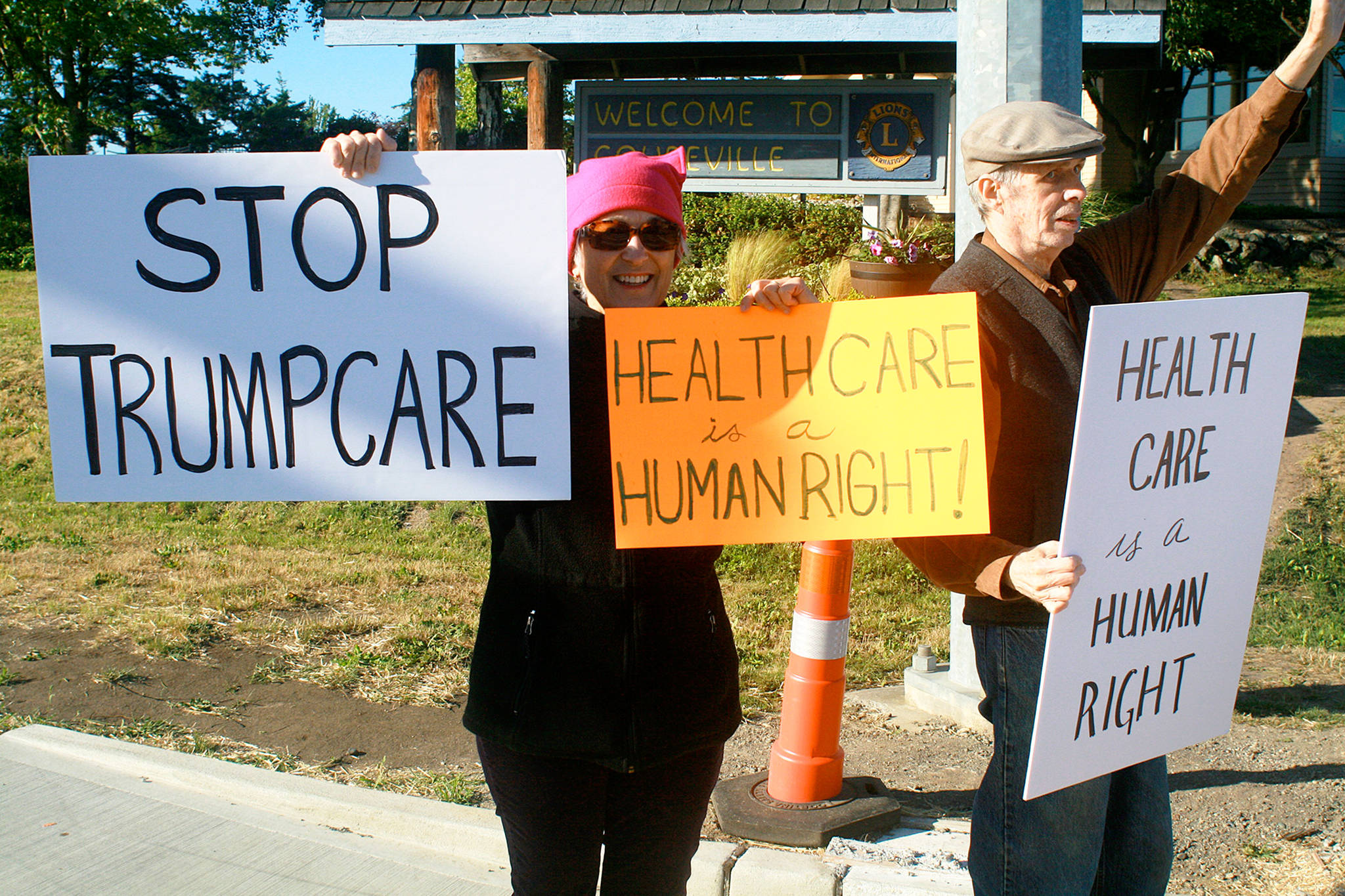It’s not every day that 20-somethings in pickup trucks scream obscenities at a handful of retirees holding signs. But, that’s exactly what happened Tuesday at the intersection of Highway 20 and Main Street in Coupeville.
Twice.
As the first sped through the intersection screamed, “[expletive] you,” at the protesters, who held signs saying things like “Stop Trumpcare,” and “Healthcare is a human right.”
The second stopped at the traffic light and yelled, “Work for your [expletive] money,” repeatedly.
Over the course of 24 hours, up to 50 members of the group Indivisible Whidbey held a vigil between WhidbeyHealth Medical Center and the intersection, protesting in two-hour shifts.
Larry Behrendt, leader of Indivisible Whidbey, said the group organized the vigil to voice resistance the belabored American Health Care Act, which passed in the House of Representatives. The AHCA, an act meant to replace Obamacare, would dial back Medicaid subsidies by hundreds of billions of dollars.
When the Senate received the legislation, it opted to develop its own replacement bill in secret, the first draft of which was released Thursday. The Senate’s bill retained sharp cuts to Medicaid, which the Affordable Care Act expanded under President Barack Obama.
Those proposed cuts are what Behrendt and company oppose most stringently.
“The Medicaid expansion in particular provided a new source of funding for the hospital,” Behrendt said. “The removal of that source of income could be devastating to our rural hospital.”
Ron Wallin, president of the WhidbeyHealth Board of Commissioners, was aware of the protesters and sympathized with their concerns, but expressed hope that lawmakers could figure out a way to watch out for the little guy.
“You would hope and think our politicians could work together to find a workable solution,” Wallin said. “I feel that the (AHCA) needs work as most new things do, but to put so many people and rural hospitals in jeopardy is wrong.”
“They all need to work for the better good of the people and not politics,” he added. “As a small rural hospital, the actions of D.C. scare me; with all the uncertainties, they need to get it right.”
Each year, WhidbeyHealth has to eat millions of dollars in uncompensated care. Just last year, the organization was left with $1.9 million unpaid dollars, a figure measured in part by clients’ “bad debt” and part by “charity care given,” according to Ronald Telles, chief financial officer of WhidbeyHealth.
In 2016, the health system absorbed $869,000 in the bad debt category and $965,000 in charity.
Behrendt argues that without the Medicaid expansion, WhidbeyHealth’s unpaid dollars would skyrocket. As it stands, hospital personnel are doing everything they can to enroll patients in Medicaid for just that reason.
Telles said 20 percent of WhidbeyHealth’s patients are on Medicaid. And according to Patricia Duff, community relations and marketing coordinator for WhidbeyHealth, 1,426 of those patients enrolled since 2014.
Ultimately, Behrendt said he fears for the hospital’s future.
“I’m concerned that the only hospital on Whidbey Island would have to shut down or scale back do to Medicaid cuts,” he said, adding that he doesn’t want to think about what that could mean for some people.
Behrendt’s fears aren’t without basis — 79 rural hospitals have closed since 2010 alone, according to the North Carolina Rural Health Research Program, a policy and analysis center in Chapel Hill, N.C.The hospitals shut down due to a variety of reasons, but Behrendt said the protesters didn’t want the hospital to become one of those statistics because of Medicaid cuts.
Commissioner Richard M. Hannold, chair of the Board of Island County Commissioners, said he appreciated the level of respect the protesters showed the community. However, he said they were demonstrating against legislation that is incomplete and thus unknown.
“How it will or will not affect our business is a total unknown, therefore I will be pleased when the discussions and debates at the federal level are done and a decision is made,” Hannold said. “The hardest matter to deal with in any agency is knowing that something is certain to change, but the unknown is difficult to deal with or prepare for.”
Clinton Resident Malcolm Cumming, an active member of Indivisible Whidbey, said the Indivisible Whidbey is working in concert with 500 like-organizations in every congressional district in the country.
Cumming also happened to receive a liver transplant in 2012, thanks to the Affordable Care Act.
“The goal of Indivisible is to hold our members of Congress’ feet to the fire,” Cumming said. “If they are supportive, we try to support them.”



